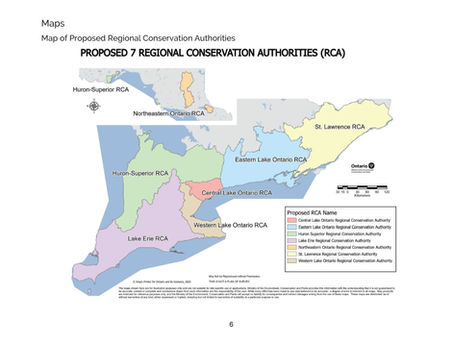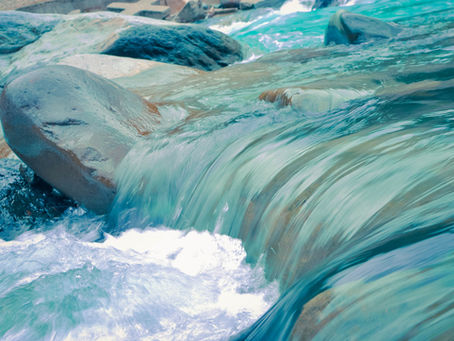top of page


Province proposing the consolidation of Ontario’s 36 Conservation Authorities into regional Conservation Authorities
Proposed seven Regional Conservation Authorities
Nov 21, 20252 min read


GOOD NEWS! Phragmites Removal at Lynde Shores Conservation Area: Enjoy the View!
The Lynde Shores Phragmites Control Project is expanding efforts to manage and control invasive Phragmites at Lynde Shores Conservation Area.
Dec 23, 20255 min read


CLOCA receives $1.6M in federal funding for Improving Climate Resiliency of Oshawa Second Marsh
Central Lake Ontario Conservation Authority (CLOCA) is pleased to announce the recent award of $1,614,500 of funding to CLOCA, as the project lead, from the Canada Water Agency (CWA) through The Great Lakes Freshwater Ecosystem Initiative for the Improving Climate Resilience at Oshawa Second Marsh Project. This Project builds on years of CLOCA’s monitoring and research, and partnerships with organizations such as Ducks Unlimited Canada, Friends of Second Marsh, the City of Os
Oct 30, 20252 min read


Today is September 30, the National Day for Truth and Reconciliation in Canada
Today marks a Canadian day of remembrance to recognize the atrocities and multi-generational effects of the Canadian Indian residential...
Sep 30, 20252 min read


Lynde Shores Phragmites Control Project
The Lynde Shores Phragmites Control Project is expanding efforts to manage and control invasive Phragmites at Lynde Shores Conservation Area.
Sep 18, 20252 min read


Salmon Spawning...Where to Report Poaching
Salmon spawning starts in September! In the past, CLOCA has received alerts from the community regarding poaching taking place in the Bowmanville Creek, and we appreciate and understand the legitimate concerns. Salmon in the Oshawa Creek Please note that the Ontario Ministry of Natural Resources (MNR) enforces fishing regulations in the Province of Ontario and patrols the Bowmanville Creek (the land is owned and managed by the Municipality of Clarington). Rest assured that ch
Sep 6, 20251 min read


Notice of Level 1 Low Water Conditions
Central Lake Ontario Conservation Authority has issued a Level 1 Low Water conditions statement for watersheds within the CLOCA jurisdiction as a result of persistent dry conditions and below average rainfall in the months of June and July. CLOCA’s hydrologic monitoring program looks at streamflow and precipitation within the watershed over 30- and 90-day periods to determine low water status. In June and July, our watershed received below 80% of the normal precipitation for
Sep 2, 20252 min read


Spring Safety Message: Be Careful Around Waterways
Hazardous conditions on and around bodies of water Central Lake Ontario Conservation Authority (CLOCA) reminds residents of dangers that...
Mar 7, 20252 min read


Celebrating 50 Years of Maple Syrup!
This year marks a significant milestone for Central Lake Ontario Conservation Authority (CLOCA): 50 YEARS of collecting maple sap and...
Feb 25, 20251 min read


Restoration Happening at Lynde Shores Conservation Area!
Since January 7, 2025, draglines have been used to dig out channels and open water areas within the dense cattail stands of Lynde Marsh on the north side of Victoria Street. This wetland interspersion project and is the first of three restoration projects planned for Lynde Shores Conservation Area. In nature, diversity welcomes diversity. If diversity is reintroduced at the base of a habitat, plant diversity and animal diversity follow! By bringing back the balance of open wa
Jan 28, 20251 min read


Lynde Creek Flood Mapping Update
Flood or 'floodplain' mapping shows the extent of potential flooding across an area during significant storm events and is used to inform...
Jan 18, 20251 min read


Winter Safety Statement
As winter makes an appearance, Central Lake Ontario Conservation Authority (CLOCA) is here to provide winter safety information with tips...
Dec 11, 20243 min read


Continued Expansion of Rare Habitat: Local Tallgrass Prairie
Tallgrass prairie is a unique habitat that has become rare in Ontario. With less than one per cent of the area remaining (according to...
Oct 17, 20242 min read


$2.1 Million Grant Received Through The Great Lakes Freshwater Ecosystem Initiative
Central Lake Ontario Conservation Authority (CLOCA) is pleased to announce that it has been approved for $2,177,000 in funding from...
Oct 17, 20242 min read


New Development Regulations and Policies Have Been Approved
On February 16, 2024, a new regulation (Ontario Regulation 41/24) under the Conservation Authorities Act was approved by the Province of...
Mar 31, 20241 min read


Cranberry Marsh is Draining Into Lake Ontario: Coastal Wetlands and Barrier Beaches
Cranberry Marsh at Lynde Shores Conservation Area. The red circle highlights the breach in the barrier beach where the marsh was...
Mar 12, 20243 min read


Spring Safety Message: Be Careful Around Waterways
Central Lake Ontario Conservation Authority (CLOCA) reminds residents of dangers that can exist near streams, rivers, ponds, and lakes....
Mar 8, 20242 min read


Notice of Consultation Opportunity
Updated Central Lake Ontario Conservation Authority (CLOCA) Policy and Procedural Document for Land Use Planning and Regulation On...
Mar 1, 20241 min read


Volunteer at the Purple Woods Maple Syrup Festival!
Volunteers are needed for a variety of positions including assisting with children's activities, admissions, parking, and the greeter and...
Feb 8, 20241 min read


Accepting Applications! Trees for Rural Roads Program
Want to plant FREE trees along the roadside of your rural property? 🌲 The Trees for Rural Roads Program is once again being offered in...
Feb 5, 20241 min read
bottom of page
